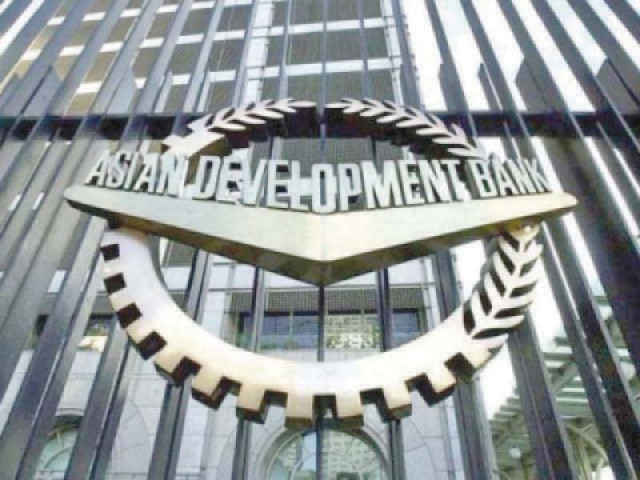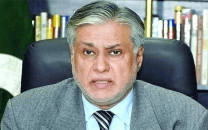ADB says it will not finance CPEC projects
Lender says budgetary support depends on clean bill of economic health from IMF

For the next three years, the Manila-based lender has proposed to provide $2.4 billion or 32% of the total loans for budgetary support to Pakistan. PHOTO: FILE
The ADB is an international financial institution and cannot become part of any bilateral initiative like the CPEC, said ADB Strategy, Policy and Review Department Director General Tomoyuki Kimura while speaking to journalists. Kimura was on a two-day visit to Pakistan. The ADB Country Director Xiaohong Yang was also present at the press conference.
The DG maintained that the ADB was ready to support regional initiatives like the Belt and Road Initiative (BRI), also brainchild of the Chinese president. He stated that if the ADB found common objectives in any regional project including the BRI, it would readily finance such schemes.
The ADB is dominated by Japan and the United States, while China also has some influence.
Nonetheless, Yang maintained that there were common objectives between CPEC and Central Asia Regional Economic Cooperation (CAREC). She pointed out that it was high time to link economic corridors and other regional initiatives. Yang is a Chinese national. Yang further advised Pakistan to be watchful in handling the mega mainline-I project of the CPEC, which has an estimated cost of $8.2 billion.
“The ML-I is a very expensive mega project and the government needs to explore all possible ways to make sure that the project is financially sustainable,” said the country director. “ADB is aiding Pakistan in reviving the Pakistan Railways.”
To a question, Yang replied that the ADB was ready to provide policy loans to Pakistan but it needed the IMF assessment letter to dispatch these loans.
The ADB and the World Bank suspended Pakistan’s budgetary support due to deterioration in macroeconomic conditions. Yang shared that all the donors came together on the issue of economic stabilisation policies that are to be implemented by Pakistan and it was not only about the IMF.
The DG informed that the government has broad based commitment to structural reforms and the ADB would support these reforms through policy lending.
For the next three years, the Manila-based lender has proposed to provide $2.4 billion or 32% of the total loans for budgetary support to Pakistan. The DG backed the Pakistan Tehreek-e-Insaf (PTI) government’s stance on the privatisation of loss-making power distribution companies. Long time ago, the donors pushed the privatisation policies but the ADB is now taking a different approach on this issue, said Kimura.
Sometimes privatisation might be good but often it is very difficult to privatise loss-making enterprises due to their financial conditions, stressed the DG policy.
The country director said that the ADB was adopting a bottom-up approach on privatisation of loss-making enterprises. She added that the power distribution companies have to be financially viable before these can be privatised.
She further highlighted that the ADB was working on an integrated energy policy to address Pakistan’s energy sector problems. A timeline is also being developed to address the issue of circular debt in the power sector.
Moving further, Kimura briefed about the ADB’s long-term strategic framework, the Strategy 2030, introduced in July. He said that the new strategy has been developed in light of evolving economic conditions in Asia and the Pacific region.
The strategy 2030 enables ADB to respond better to Pakistan’s transforming development needs, he added. The DG told the participants that ADB shared Pakistan’s vision to accelerate sustainable and inclusive economic growth by promoting innovative technologies and delivering development solutions through a mix of public and private sector operations.
“ADB supports Pakistan’s agenda of diversifying exports to revitalise the economy and generate jobs,” he emphasised. “The country needs to continue to improve key infrastructure, energy supply, domestic resource mobilisation and the cost of doing business to ensure higher levels of competitiveness and productivity, and to link up with the global production networks and value chains.”
He encouraged Pakistan to resolve structural impediments to economic development through reforms that revive and diversify exports for job creation. “Pakistan needs to improve skills and labour market efficiency, enhance financial inclusion and deepening, and promote greater infrastructure, investment, private sector, foreign direct investment, and trade integration,” he quoted.
Under Strategy 2030, the ADB will focus on seven operational priorities aimed at addressing remaining poverty and reducing inequalities. The other pillars are accelerating progress in gender equality, tackling climate change, building climate and disaster resilience and enhancing environmental sustainability, making cities more liveable, promoting rural development and food security.
Strengthening governance and institutional capacity and fostering regional cooperation and integration are also pillars of the new strategy.
Published in The Express Tribune, December 20th, 2018.
Like Business on Facebook, follow @TribuneBiz on Twitter to stay informed and join in the conversation.



















COMMENTS
Comments are moderated and generally will be posted if they are on-topic and not abusive.
For more information, please see our Comments FAQ